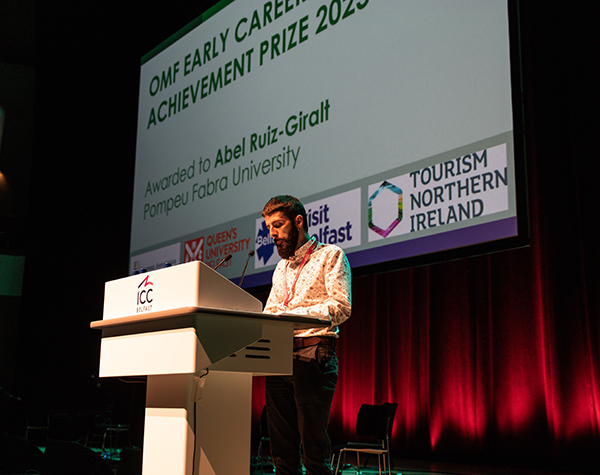Abel Ruiz-Giralt

Abel Ruiz-Giralt at EAA 2023 Opening Ceremony © Joe Warden photography
Abel Ruiz-Giralt is awarded the 2023 prize on the grounds of the social, innovation, interdisciplinarity and international impact of his early career work.
Abel is a young researcher using a combination of archaeology and ethnoarchaeology applying his knowledge to inform responses to climate change. His doctoral thesis is, entitled: "Resilience and adaptation to drylands in northeastern Ethiopia". Most of his work is already published providing new and valuable insights into the past, identifying practical implications for sustainable agriculture and, pointing out direction for further archaeological exploration. This makes him an exceptional candidate for the Oscar Montelius prize.
In Abel's scientific work, together with colleagues, they have investigated the interaction between environment and traditional agro-systems and new ethnographic data.
Finger millet, pearl millet and sorghum are amongst the most important drought-tolerant crops worldwide. They constitute primary staple crops in drylands, where their production is known to date back more than 5000 years. The models used in Abel’s work shows that the duration of the plant growing cycle as soil water-holding capacity and soil nutrient availability are determinant in the cultivation. Traditional cultivation practices of millet and sorghum need to be reconsidered in response to the increase in aridity levels worldwide. Local traditional cultivation methods and knowledge therefore play a vital role to meet climate change and provide potential to contribute to resilience and sustainability in dryland agriculture.
The criteria:
Societal impact: Abel's recent work presents a comprehensive assessment of traditional small-scale farming practices for three of the world's most important drought-tolerant species. By combining ethnographic data, modelling, and new technologies, Abel has unravelled the complexities of ancient regional food production and their implications for contemporary agricultural practices.
Innovative impact: Abel's contributions in ethno-archaeological research, has made a breakthrough in understanding the early agricultural practices. Through analysis of micro-botanical residues from archaeological sites in Ethiopia, the existing knowledge about the origin, time of domestication, and consumption of various African C4 plants, are challenged.
Interdisciplinary impact: Abel's contribution to the work on identifying anthropogenic features at Seoke in Botswana demonstrates his versatility and innovative approach in archaeology. By utilizing portable X-ray fluorescence (pXRF) analysis coupled with among others, geostatistical modelling, his work highlights the potential of this cost-effective, and minimally invasive technique to detect chemical markers in anthropogenic sediments.
International impact: Abel's work contributes to find solutions to one of the biggest challenges in our time with climate change. This summer we witnessed extremely hot temperatures worldwide which affect the viability of modern food production. In this light Abel's work is of outstanding importance demonstrating that the use of traditional crops and cultivation methods can meet climate change.
In view of his work, Abel Ruiz-Giralt, can be truly considered an outstanding early career archaeologist, fulfilling all selection criteria. He is therefore awarded the 2023 Early Career Achievement Prize of the Oscar Montelius Foundation.